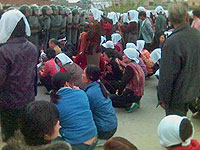




HONG KONG—Authorities in the southern Chinese port city of Shanwei have continued their clampdown on the village of Dongzhou, enforcing a news blackout over the area following a raid which released eight government hostages, villagers said.
"The villagers are still so scared," one resident told RFA's Cantonese service. "Four trucks full of police are stationed along the road in order to prevent any reporters coming into the village. So it is in a mess."
He also said four armoured vehicles were guarding each entrance to the village.
Another villager said an American reporter had hidden at his house and asked the U.S. Embassy in Beijing for help. He said: "A U.S. reporter came here. He was afraid of going out and hid here. Then, I don't know why, but he went out."
An Associated Press report said a photographer from the New York Times was beaten by police in Dongzhou.
Many police officers showed up with dogs and surrounded the village. We were scared.
The villager added: "The officials have got all our land across the whole area. We don't even have anything to eat. They put so much pressure on us, how can we maintain a life?"
Police stormed a small temple in Dongzhou in a pre-dawn raid Saturday that freed eight local officials held hostage for more than a week by residents angered by the detention of a village activist.
“Many police officers showed up with dogs and surrounded the village. We were scared,” a local woman told RFA’s Mandarin service. Witnesses said police with dogs stormed the temple at 3 a.m. on Nov. 18.
“They didn’t release Chen Qian,” she said, referring to the villager detained Nov. 9 while he hung anti-corruption posters in the village. “Instead, they detained three more.”
Another villager, surnamed Huang, also told RFA's Mandarin service that a foreign reporter, “probably an American,” appeared in the village Saturday.
Police were waiting for the reporter in the taxi he had hired, possibly in hope of detaining him. “But the reporter disappeared and no one knows his whereabouts now,” Huang said.
A local police officer, contacted by phone, said he knew nothing about a foreign reporter but added that all reporting must be conducted in compliance with Chinese laws.
All Internet connection is dead. We cannot get online from home.
According to the Information Center for Human Rights and Democratic Movement in China, the two detained villagers were released later Saturday, saying police had beaten them. No comment from police was immediately available.
Between 200 and 300 police, some in riot gear, remained on guard at major roads around the village on Sunday, witnesses said.
Huang said police were stopping and searching vehicles at checkpoints throughout the village.
On Friday, villagers told RFA’s Mandarin and Cantonese services that the village was largely shuttered with up to 1,000 armed police on guard. Schools, shops, and offices were mostly closed, they said, describing the area as extremely tense.
Less than a year ago in the same village, paramilitary forces shot and killed at least three people protesting what they said was inadequate compensation for land used to build a power station.
Many residents declined to be interviewed by telephone on Friday, and Internet connections remained cut off. “All Internet connection is dead. We cannot get online from home. It started yesterday,” a male villager said on condition of anonymity.
The standoff began Nov. 9, when Dongzhou police detained villager Chen Qian, described by neighbors as in his fifties and as hanging anti-corruption banners in the village when he was taken into custody.
Hundreds of villagers went to the neighborhood committee the following day to demand his release and took eight village cadres hostage when they refused, villagers said.
Local authorities have indicated that Chen Qian was to be indicted, but the charges against him are unknown.
On Dec. 6 last year, according to China’s official Xinhua news agency, police opened fire “in alarm” on protesters who attacked them with home-made explosives, killing at least three people.
But the villagers said police fired first on an unarmed crowd, and that the death toll was higher than official reports admitted
Dongzhou appears to be experiencing one of the thousands of protests and confrontations that the Chinese government says happen every year despite efforts to address widespread corruption allegations and growing disparities in wealth.
According to an official report, the number of protests and riots in China fell by more than one-fifth in the first nine months of 2006, down 22.1 percent from a year earlier. Many protests are related to land seizures, pollution, and corruption.
Original reporting in Mandarin by Ding Xiao, and in Cantonese by Lee Kin-kwan. Translated by Cheng Ping. RFA Mandarin service director: Jennifer Chou. RFA Cantonese service director: Shiny Li. Produced and written in English by Sarah Jackson-Han. Edited by Dan Southerland and Luisetta Mudie.